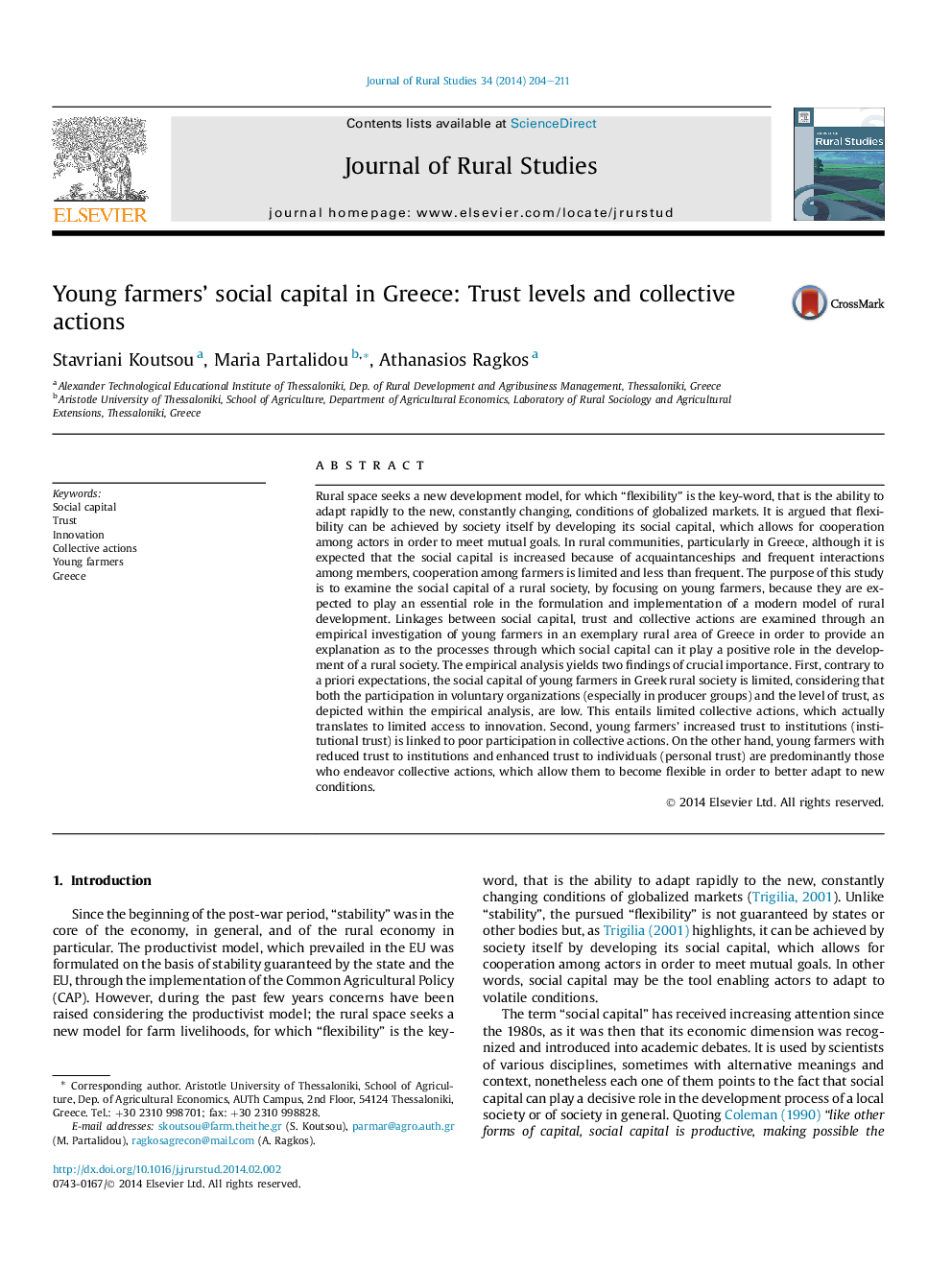| کد مقاله | کد نشریه | سال انتشار | مقاله انگلیسی | نسخه تمام متن |
|---|---|---|---|---|
| 6545825 | 159970 | 2014 | 8 صفحه PDF | دانلود رایگان |
عنوان انگلیسی مقاله ISI
Young farmers' social capital in Greece: Trust levels and collective actions
ترجمه فارسی عنوان
سرمایه اجتماعی جوانان کشاورزان در یونان: سطح اعتماد و اقدامات جمعی
دانلود مقاله + سفارش ترجمه
دانلود مقاله ISI انگلیسی
رایگان برای ایرانیان
کلمات کلیدی
سرمایه اجتماعی، اعتماد، نوآوری، اقدامات جمعی، کشاورزان جوان، یونان،
ترجمه چکیده
فضای روستایی به دنبال یک مدل توسعه جدید است، که انعطاف پذیری آن است؟ کلید واژه است، یعنی توانایی به سرعت در حال انطباق با شرایط جدید و دائما در حال تغییر بازارهای جهانی است. استدلال می شود که انعطاف پذیری را می توان توسط جامعه به دست آورد، با توسعه سرمایه اجتماعی خود، که اجازه می دهد تا همکاری بین بازیگران برای رسیدن به اهداف متقابل. در جوامع روستایی، به ویژه در یونان، اگر چه پیش بینی می شود که سرمایه اجتماعی به دلیل آشنایی و تعامل مکرر بین اعضای خانواده افزایش یابد، همکاری میان کشاورزان محدود و کمتر از مکرر است. هدف از این مطالعه بررسی سرمایه اجتماعی جامعه روستایی با تمرکز بر کشاورزان جوان است، زیرا انتظار می رود که آنها نقش مهمی در شکل گیری و اجرای یک مدل مدرن توسعه روستایی ایفا کنند. ارتباط بین سرمایه اجتماعی، اعتماد و اقدامات جمعی از طریق بررسی تجربی از کشاورزان جوان در منطقه روستایی یونان به منظور ارائه توضیحی در مورد فرایندهایی که از طریق آن سرمایه اجتماعی می تواند نقش مثبت در توسعه یک جامعه روستایی تجزیه و تحلیل تجربی دو نتیجه از اهمیت حیاتی را به دست می دهد. اول، بر خلاف انتظارات پیشین، سرمایه اجتماعی کشاورزان جوان در جامعه روستایی یونان محدود است، با توجه به اینکه مشارکت در سازمان های داوطلبانه (به ویژه در گروه های تولید کننده) و سطح اعتماد، همانطور که در تجزیه و تحلیل تجربی نشان داده شده اند، کم است . این مستلزم اعمال محدود جمعی است که در واقع به دسترسی محدود به نوآوری می پردازد. دوم، افزایش اعتماد به نهادها (اعتماد سازمانی) کشاورزان جوان به مشارکت ضعیف در اقدامات جمعی مرتبط است. از سوی دیگر، کشاورزان جوان با کاهش اعتماد به موسسات و افزایش اعتماد به افراد (اعتماد شخصی) عمدتا کسانی هستند که اقدامات جمعی را دنبال می کنند، که به آنها اجازه می دهد انعطاف پذیر شوند تا بتوانند با شرایط جدید سازگار شوند.
موضوعات مرتبط
علوم زیستی و بیوفناوری
علوم کشاورزی و بیولوژیک
جنگلداری
چکیده انگلیسی
Rural space seeks a new development model, for which “flexibility” is the key-word, that is the ability to adapt rapidly to the new, constantly changing, conditions of globalized markets. It is argued that flexibility can be achieved by society itself by developing its social capital, which allows for cooperation among actors in order to meet mutual goals. In rural communities, particularly in Greece, although it is expected that the social capital is increased because of acquaintanceships and frequent interactions among members, cooperation among farmers is limited and less than frequent. The purpose of this study is to examine the social capital of a rural society, by focusing on young farmers, because they are expected to play an essential role in the formulation and implementation of a modern model of rural development. Linkages between social capital, trust and collective actions are examined through an empirical investigation of young farmers in an exemplary rural area of Greece in order to provide an explanation as to the processes through which social capital can it play a positive role in the development of a rural society. The empirical analysis yields two findings of crucial importance. First, contrary to a priori expectations, the social capital of young farmers in Greek rural society is limited, considering that both the participation in voluntary organizations (especially in producer groups) and the level of trust, as depicted within the empirical analysis, are low. This entails limited collective actions, which actually translates to limited access to innovation. Second, young farmers' increased trust to institutions (institutional trust) is linked to poor participation in collective actions. On the other hand, young farmers with reduced trust to institutions and enhanced trust to individuals (personal trust) are predominantly those who endeavor collective actions, which allow them to become flexible in order to better adapt to new conditions.
ناشر
Database: Elsevier - ScienceDirect (ساینس دایرکت)
Journal: Journal of Rural Studies - Volume 34, April 2014, Pages 204-211
Journal: Journal of Rural Studies - Volume 34, April 2014, Pages 204-211
نویسندگان
Stavriani Koutsou, Maria Partalidou, Athanasios Ragkos,
